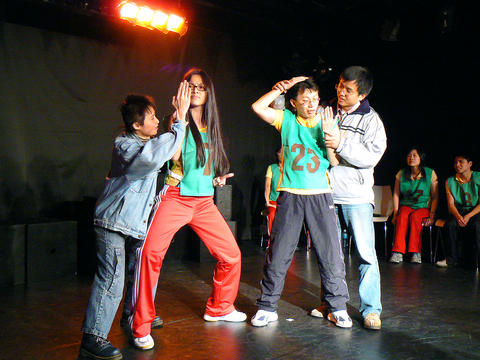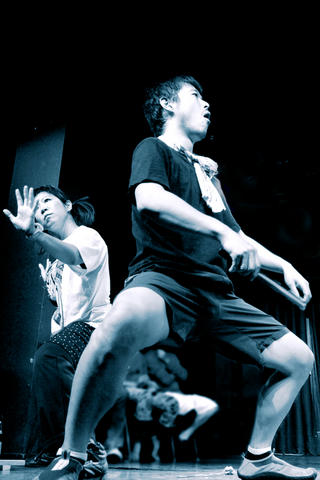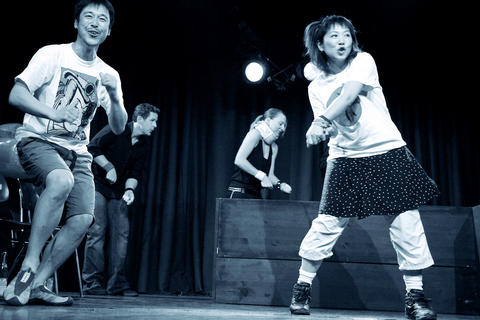Ever felt like yelling out in a theater performance, but were too afraid? Or felt that shouting out your opinion was inappropriate or rude? Well beginning tonight at The Mayor's Residence Art Salon prepare for a performance in which the audience can become the actor and passive spectators are frowned upon.
"I always emphasize [to the audience] that in this show we work together," said Taiwan's Guts Improv Theater (勇氣即興劇場) founder and this weekend's Theatersports' emcee Wu Hsiao-hsien (吳效賢), referring to the relationship between audience and actors.
It's a sentiment shared by Japan's Impro Works and Hong Kong's Champion Arts Association (青皮人藝術合作社), the other two companies that have come to Taiwan to compete in the Theatersports contest.

PHOTOS: COURTESY OF GUTS IMPROV THEATER
"Competition is just the format," said Shirley Chan (陳明慧) of Champion Arts. "We are still working together and we are playing." Though it"s cloaked in competitiveness, the purpose of the performance is to suck the audience into the action on stage, turning them into creators as well as observers.
Let's rumble
Theatersports is a performance style that finds its origins in improvisational theater (improv or impro, depending on the dictionary you use) and stresses the importance of the audience's active participation. It involves two different formats: long and short. Short form is more competitive in the sense that two teams take the stage at the same time. The long form involves one team and lasts for 30 minutes. This weekend's performances will be held in English and Chinese.

PHOTO: COURTESY OF GUTS IMPROV THEATER
Though each improv company approaches Theatersports in a slightly different manner, the basic format includes teams of actors - professional or otherwise - performing in front of judges while an emcee implores the audience to shout out their ideas, suggestions and criticisms, particularly to the judges.
"In Japan, the judges' status [in society] is very high, so it is seen as very rude to criticize them. So I explain before the performance begins that judges are supposed to encourage the audience to criticize them," said Yuri Kinugawa, art director of Japan's Improv Works.
Champion Arts Association uses a different format. "We ask the audience to be the judges. We will explain [the format] before the show and ask for suggestions because that will involve more [of the] audience. Though some audience members really don't want to get involved in the performance or even give any suggestions, they are always willing to give marks," said Chan.

PHOTO: COURTESY OF GUTS IMPROV THEATER
The Taipei competition will employ three judges and suggestions will come from the audience.
Communicating with the audience members and making it clear they are to be active participants, the three companies agree, remains the biggest obstacle confronting Theatersports in Asia.
Cultural obstacles?
"Because there are conceptual and cultural differences here, it is necessary for the audience to gain an understanding of what they are going to encounter on the stage and that, yes, they are going to be participants," Chan said.
She added that audiences in Hong Kong are so used to traditional theater they often remain silent in the theater, even though the emcee is imploring them to speak up. "It is very different from what we have seen ... in Canada and the US, where the audience members will shout and scream and get involved," Chan said.
Still, with an energetic emcee on the mic, even the most reticent of crowds may turn from speechless statues to raucous participants.
"You (the audience) make the show, it's not just us performing for you. We need your input to complete this show," Wu said.
It's an attitude that should keep the audience members on the edge of their seat.

Towering high above Taiwan’s capital city at 508 meters, Taipei 101 dominates the skyline. The earthquake-proof skyscraper of steel and glass has captured the imagination of professional rock climber Alex Honnold for more than a decade. Tomorrow morning, he will climb it in his signature free solo style — without ropes or protective equipment. And Netflix will broadcast it — live. The event’s announcement has drawn both excitement and trepidation, as well as some concerns over the ethical implications of attempting such a high-risk endeavor on live broadcast. Many have questioned Honnold’s desire to continues his free-solo climbs now that he’s a

As Taiwan’s second most populous city, Taichung looms large in the electoral map. Taiwanese political commentators describe it — along with neighboring Changhua County — as Taiwan’s “swing states” (搖擺州), which is a curious direct borrowing from American election terminology. In the early post-Martial Law era, Taichung was referred to as a “desert of democracy” because while the Democratic Progressive Party (DPP) was winning elections in the north and south, Taichung remained staunchly loyal to the Chinese Nationalist Party (KMT). That changed over time, but in both Changhua and Taichung, the DPP still suffers from a “one-term curse,” with the

Jan. 26 to Feb. 1 Nearly 90 years after it was last recorded, the Basay language was taught in a classroom for the first time in September last year. Over the following three months, students learned its sounds along with the customs and folktales of the Ketagalan people, who once spoke it across northern Taiwan. Although each Ketagalan settlement had its own language, Basay functioned as a common trade language. By the late 19th century, it had largely fallen out of daily use as speakers shifted to Hoklo (commonly known as Taiwanese), surviving only in fragments remembered by the elderly. In

Lines between cop and criminal get murky in Joe Carnahan’s The Rip, a crime thriller set across one foggy Miami night, starring Matt Damon and Ben Affleck. Damon and Affleck, of course, are so closely associated with Boston — most recently they produced the 2024 heist movie The Instigators there — that a detour to South Florida puts them, a little awkwardly, in an entirely different movie landscape. This is Miami Vice territory or Elmore Leonard Land, not Southie or The Town. In The Rip, they play Miami narcotics officers who come upon a cartel stash house that Lt. Dane Dumars (Damon)